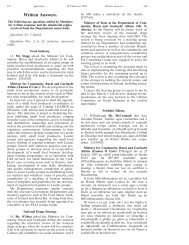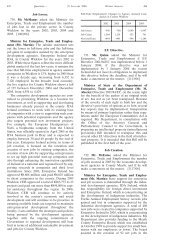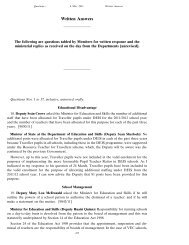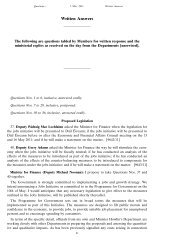Written Answers. - Parliamentary Debates - Houses of the Oireachtas
Written Answers. - Parliamentary Debates - Houses of the Oireachtas
Written Answers. - Parliamentary Debates - Houses of the Oireachtas
Create successful ePaper yourself
Turn your PDF publications into a flip-book with our unique Google optimized e-Paper software.
Questions— 14 February 2012. <strong>Written</strong> <strong>Answers</strong><br />
Minister for Health (Deputy James Reilly): On 1st February, my Department requested <strong>the</strong><br />
HSE to prepare a report (to be submitted to me by <strong>the</strong> end <strong>of</strong> this week) on <strong>the</strong> actions, if<br />
required, to minimise <strong>the</strong> risk <strong>of</strong> pseudomonas infection in augmented care settings (i.e. high<br />
dependency, adult and neonatal critical care) such as raising awareness <strong>of</strong> <strong>the</strong> potential infection<br />
risks posed by water systems; reinforcing good practice for <strong>the</strong> management <strong>of</strong> water<br />
delivery systems; working with estates management to identify potential risk areas; developing<br />
guidance on pseudomonas and augmented care settings etc. In <strong>the</strong> meantime <strong>the</strong> HSE has<br />
issued guidelines on <strong>the</strong> prevention <strong>of</strong> pseudomonas infection in neonatal units.<br />
EU Directives<br />
705. Deputy David Stanton asked <strong>the</strong> Minister for Health if <strong>the</strong> directive on cross-border<br />
health care, that was adopted by <strong>the</strong> European Council and <strong>the</strong> European Parliament in<br />
February 2011, has been transposed into Irish law; and if he will make a statement on <strong>the</strong><br />
matter. [8135/12]<br />
Minister for Health (Deputy James Reilly): The Directive on <strong>the</strong> Application <strong>of</strong> Patients’<br />
Rights in Cross Border Healthcare was published in <strong>the</strong> EU Official Journal on 4th April 2011<br />
and <strong>the</strong> transposition period <strong>of</strong> 30 months commenced on 24th April 2011. Member States have<br />
until October 2013 to implement <strong>the</strong> Directive. The purpose <strong>of</strong> this patient-focussed Directive<br />
is to establish a clear legal framework to facilitate cross border healthcare with a focus on<br />
patient rights, information for patients on entitlements and patient choice. This will require all<br />
Member States to put in place processes to allow for <strong>the</strong> exchange <strong>of</strong> information on treatments,<br />
and <strong>the</strong>ir cost, to citizens across <strong>the</strong> EU. Member States will also have to facilitate <strong>the</strong><br />
exchange <strong>of</strong> patient information following treatment and put in place mechanisms to refund<br />
patients up to <strong>the</strong> amount <strong>the</strong> treatment would have cost <strong>the</strong>m to have received <strong>the</strong> same<br />
procedure in <strong>the</strong>ir own Member State.<br />
Given <strong>the</strong> complexity <strong>of</strong> <strong>the</strong> issues to be considered, both nationally and between Member<br />
States, it is envisaged that <strong>the</strong> transposition <strong>of</strong> <strong>the</strong> Directive into Irish law will be completed<br />
within <strong>the</strong> transposition time frame <strong>of</strong> October 2013.<br />
Health Policy<br />
706. Deputy David Stanton asked <strong>the</strong> Minister for Health <strong>the</strong> steps events, policies and so<br />
on being taken by him throughout 2012 to promote <strong>the</strong> European Year <strong>of</strong> Active Aging; and<br />
if he will make a statement on <strong>the</strong> matter. [8136/12]<br />
Minister <strong>of</strong> State at <strong>the</strong> Department <strong>of</strong> Health (Deputy Kathleen Lynch): Following a codecision<br />
<strong>of</strong> <strong>the</strong> European Parliament and <strong>of</strong> <strong>the</strong> Council <strong>of</strong> Ministers, 2012 has been designated<br />
as <strong>the</strong> European Year for Active Ageing and Solidarity between Generations. The Year provides<br />
an opportunity to reflect on how Europeans are living longer and staying healthier than<br />
ever before — and to realise <strong>the</strong> opportunities that represents. The Year also places a focus<br />
on solidarity between generations (or “intergenerational solidarity”) which refers to <strong>the</strong> mutual<br />
support and cooperation between different age groups in order to achieve a society where<br />
people <strong>of</strong> all ages have a role to play in line with <strong>the</strong>ir needs and capacities, and can benefit<br />
from <strong>the</strong>ir community’s economic and social progress on an equal basis.<br />
The aim <strong>of</strong> <strong>the</strong> Year is to encourage and support <strong>the</strong> efforts <strong>of</strong> Member States, <strong>the</strong>ir regional<br />
and local authorities, social partners, civil society and <strong>the</strong> business community to mobilise<br />
demographic opportunities, and to embrace <strong>the</strong> contribution that older people can make to<br />
society by promoting active ageing. The Department <strong>of</strong> Health is co-ordinating <strong>the</strong> Year for<br />
640











![[Deputy Michael Noonan.]](https://img.yumpu.com/30494839/1/190x245/deputy-michael-noonan.jpg?quality=85)




